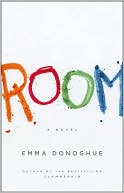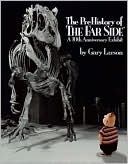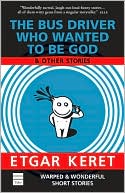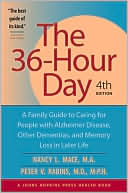Susan Casey, author of
The Devil's Teeth: A True Story of Obsession and Survival Among America's Great White Sharks (which I now want to read), writes
The Wave: In Pursuit of the Rogues, Freaks, and Giants of the Ocean. It is, you guessed it, about waves - rogue waves, monster waves, tsunamis - waves that wreak havoc. The point? Waves are getting bigger. Waves are hard to predict.
Scientists haven't been studying ocean waves for all that long. It's difficult to determine, let alone monitor all the factors that go into creating waves. Scientists have been building models to try and predict huge freak waves.
Surfers also try to predict waves, though for different reasons. They want to ride them.
Casey spent time with extreme surfers and their quest for great waves as the framework for exploring waves and their immensity, power, and unpredictability. Laird Hamilton, Brett Lickle, Dave Kalama and other surfing greats feature prominently here. She also spent time with scientists who are trying to figure out how to predict waves as well as why they seem to be getting bigger. Scientists such as Penny Holliday, who travels on ships with monitoring devices to try to determine the cause of large waves. Nicholas Sloane lives in South Africa right off the Wild Coast, where ships have to deal with the Agulhas Current, some of the most treacherous water anywhere in the world.
Waves have been increasing in height and severity, causing more damage to ships and coastal areas. Scientists are trying to determine why waves are getting wilder, and how they can predict when and where they'll hit.
She shares some facts about waves that are mind-boggling and sobering...
"Tsunamis, waves caused by sudden lurchings of the earth's crust, are the ocean's speed champions. Their wavelengths can be more than one hundred miles long, and they can travel faster than jets."
"To his shock, he found that two hundred yards below the ship, gargantuan underwater waves more than six hundred feet high and ten miles long were rumbling by at the speed of four knots."
"...twenty seven vessels along with 654 people were lost during a four-month period in the winter of 1997-1998. Oil tankers slipped from the radar, leaving only black slicks to show they'd ever existed; rescuers responding to emergency calls arrived at the coordinates and found, instead of the vessel, mangled bits of debris. 'In some cases ships had simply broken apart like a snapped pencil,' an IMO report read."
"'Tsunamis are no ordinary waves,' McGuire said with understatement. 'They are walls of water that just keep coming in. If it's one hundred feet high, it's going to be one hundred feet high for five minutes.'"
"'Wave heights around the U.K. have increase by about a third in the last few decades' - McGuire emphasized that climate change has additional wave-generating effects that few people are aware of.' If you start to see meter-scale (3.3 foot) rises in sea level, then that load starts to bend the [earth's] crust, and that would promote magma reaching the surface. That will give you a massive increase in volcanic activity. It'll activate faults to create earthquakes, submarine landslides, tsunamis, the whole lot.' As bizarre as this sounds, history - and other scientists - back up his theory."
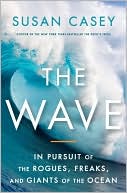


The book has some stunning photographs, some of surfers riding ridiculously high waves, some of huge waves crashing over ships, some of devastation waves have caused. I found myself going back to them repeatedly as I read.
I really liked the science she presented about waves. Chapters like the one on the devastation caused in Lituya Bay in Alaska, where extreme waves have scoured the shoreline. Or the one on Penny Holliday and her research trip on the ship Discovery, which had to be cut short - because of severe weather battering the ship. Perhaps if I were a surfer, perhaps I would have had more appreciation for the chapters about surfers surfing.
I came away from this book with an enormous appreciation of the waves themselves, their ferocity, their unpredictability, their strength, and their beauty.
"...I stared at Jaws (the name given to a surfing site and the waves it produces in Hawaii). At about forty feet, this wasn't the biggest day on record, but somehow that diminished nothing. The wave was breathtaking. As it rose, its face opened up to the cliffs and its lip curled over a full-bellied barrel. Except for luminous glints of turquoise at its peak, the wave was sapphire blue, gin clear, and flecked with white. If heaven were a color, it would be tinted like this. You could fall into this water and happily never come out and you could see it forever and never get tired of looking. Jaws did not permit its spectators to dream about being someplace else, to feel bored or irritated or jaded. Watching it was an instant antidote to petty problems. There could be no confusion about who called the shots out here, at this gorgeous, haunted, heavy, lush, primordial place, with all its unnameable blues and its abillity to nourish you and kill you at the same time. There was unspeakable power at Jaws, but it was the beauty that got me."
You can email me, Bibliophile, at 2of3Rs@gmailDOTcom.






